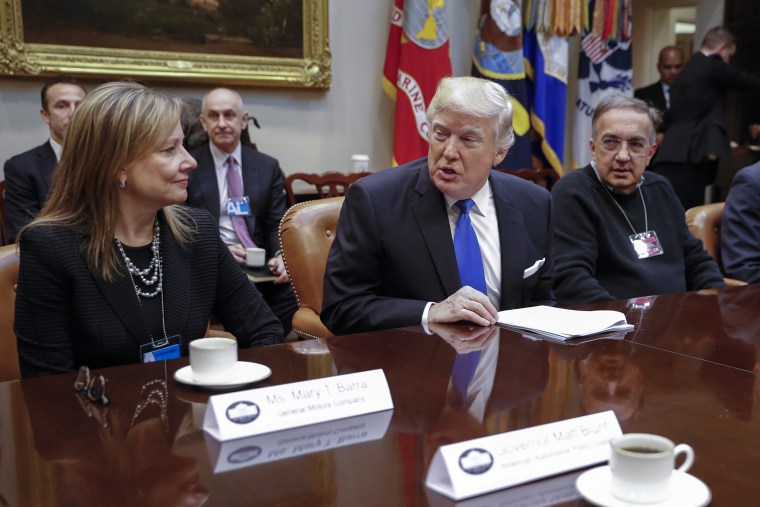President Donald Trump laid out an agenda that appears to offer cuts in federal taxes and regulations in return for more U.S. jobs during a meeting with Detroit’s Big Three automakers Tuesday morning.
The tone for the cordial but blunt, hour-long meeting was set out in the form of yet another Trump tweet that declared "I want new plants to be built here for cars sold here!"
The new president has, in recent months, taken aim at a number of automakers, both domestic and foreign, warning that he may enact a 35% tariff on imports from Mexico, Canada, and Germany to force manufacturers to shift production to the U.S.
Related: Trump Touts 'Excellent' Meeting with Union Heads on Jobs, Infrastructure
But automakers went into the morning session with an agenda of their own. They want Trump to reverse the decision made in the final days of the Obama Administration to affirm a phased-in hike in vehicle fuel economy that will reach 54.5 mpg by 2025. They’d like other regulatory relief, as well as lower corporate taxes.
Trump reportedly opened the morning meeting with General Motors CEO Mary Barra, Ford Motor Co. CEO Mark Fields and Fiat Chrysler Automobiles (FCA) CEO Sergio Marchionne by re-emphasizing the issues of jobs.
Following up with reporters after the session, he said, “We have a very big push on to have auto plants and other plants -- many other plants," adding that. "It's happening.”
In return for new plants, Trump offered to deliver on taxes and regulations in order to make it more attractive for businesses to operate in the United States.
The new administration is also thought to be considering rolling back the federal Corporate Average Fuel Economy mandate imposed by the Obama administration. It has also signaled it might try to eliminate unique powers long ago granted the State of California to enact its own, tougher emissions rules.
Auto executives emerged from the meeting, saying they were pleased with the meeting but made no specific promises.
“I appreciate the President's focus on making the U.S. a great place to do business,” said FCA Chief Executive Marchionne. “We look forward to working with President Trump and members of Congress to strengthen American manufacturing.” In total, FCA US has committed investments of more than $9.6 billion in its U.S. manufacturing facilities and created 25,000 new jobs to date since 2009, he noted.
FCA earlier this month received praise from the then president-elect for announcing a $1 billion investment in two Midwest assembly plants. Ford also received praise for a decision to cancel a second assembly plant in Mexico. But both companies’ plans were in place well before the election, and despite the new president’s attempts to take credit for them.
Related: Why Trump Killed TPP — And Why It Matters To You
GM also announced new investments in the U.S. this month that were long in the planning stage.
The maker’s CEO Mary Barra, who was named to a White House business advisory panel, called the Tuesday session, “very constructive,” adding that it included a “wide-ranging discussion about how we can work together on policies that support a strong and competitive economy and auto industry, one that supports the environment and safety,” Barra said.
The first female CEO of a major automaker, Barra emphasized that “the U.S. is our home market,” and that she, like the other executives meeting with Trump wants “a vibrant U.S. manufacturing base.” But she also emphasized the need for it to be “competitive,” something that would need White House assistance.
The morning session was actually the second day in a row that Ford CEO Fields had met with President Trump. He was included in a meeting on Monday with other business leaders such as Elon Musk, the CEO of Tesla Motors.
For his part, Fields pressed for the need for “data-driven regulations” and trade policy initiatives that address foreign currency manipulation, a Ford spokeswoman said.
Whether pressure from the new president will change industry investment plans is far from certain. Several Japanese makers, including Toyota and Nissan, have expressed interest in upping their U.S. manufacturing presence. On Tuesday, Toyota announced it will add 400 jobs in Indiana as part of a previously announced capital expenditure. But it remains to be seen what others, or the Detroit Big Three actually will do.
Related: GM’s $1B Investment Is Not Driven by Trump and Likely Dates Back to 2014
GM in 2014 said it would invest $5 billion in Mexico through 2018, a move that would allow it to double its production capacity -- and Barra said during the recent North American International Auto Show that the automaker is not reconsidering the plan. Ford, meanwhile, reaffirmed its decision to manufacture its small cars in Mexico, despite scrubbing plans for a second assembly plant there.
GM and Ford also committed to new investment in Canada under a new labor agreement signed last fall with Unifor, the union representing Canadian autoworkers employed by Detroit's automakers.
For his part, President Trump has already withdrawn the U.S. from the new Trans-Pacific trade pact, and he has said he now plans to renegotiate the North American Free Trade Agreement.
But the impact of such a move – or the addition of hefty new import tariffs – has raised concerns throughout the auto industry. The Center for Automotive Research concluded in a recent study that eliminating NAFTA could drive up costs to consumers and wipe out 31,000 U.S. jobs.
